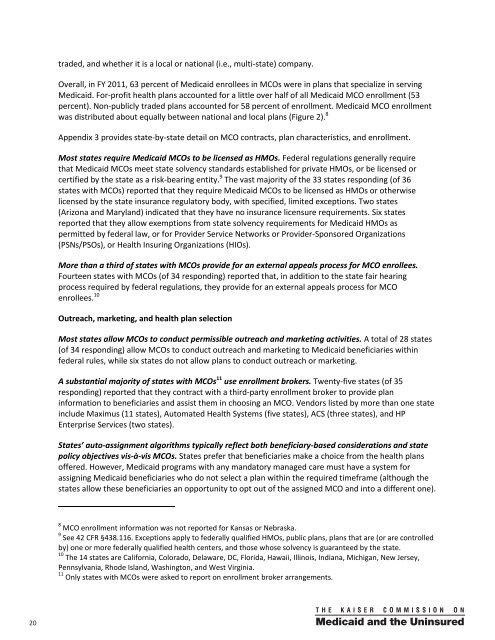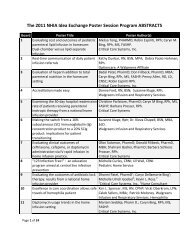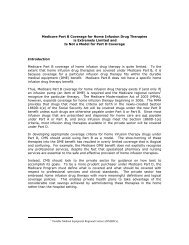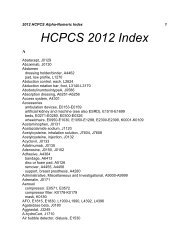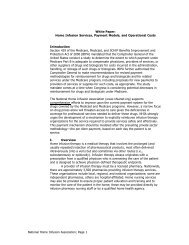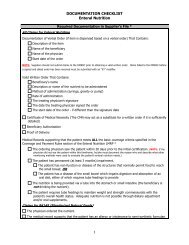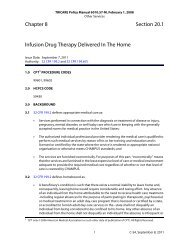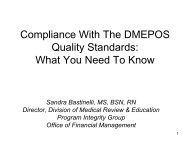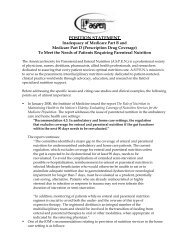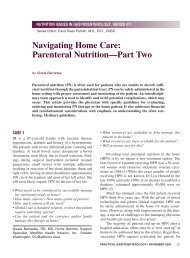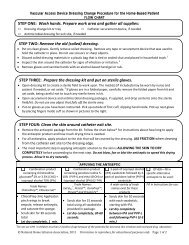Kaiser Family Foundation Survey on State Medicaid Managed Care ...
Kaiser Family Foundation Survey on State Medicaid Managed Care ...
Kaiser Family Foundation Survey on State Medicaid Managed Care ...
- No tags were found...
Create successful ePaper yourself
Turn your PDF publications into a flip-book with our unique Google optimized e-Paper software.
traded, and whether it is a local or nati<strong>on</strong>al (i.e., multi-state) company.Overall, in FY 2011, 63 percent of <strong>Medicaid</strong> enrollees in MCOs were in plans that specialize in serving<strong>Medicaid</strong>. For-profit health plans accounted for a little over half of all <strong>Medicaid</strong> MCO enrollment (53percent). N<strong>on</strong>-publicly traded plans accounted for 58 percent of enrollment. <strong>Medicaid</strong> MCO enrollmentwas distributed about equally between nati<strong>on</strong>al and local plans (Figure 2). 8Appendix 3 provides state-by-state detail <strong>on</strong> MCO c<strong>on</strong>tracts, plan characteristics, and enrollment.Most states require <strong>Medicaid</strong> MCOs to be licensed as HMOs. Federal regulati<strong>on</strong>s generally requirethat <strong>Medicaid</strong> MCOs meet state solvency standards established for private HMOs, or be licensed orcertified by the state as a risk-bearing entity. 9 The vast majority of the 33 states resp<strong>on</strong>ding (of 36states with MCOs) reported that they require <strong>Medicaid</strong> MCOs to be licensed as HMOs or otherwiselicensed by the state insurance regulatory body, with specified, limited excepti<strong>on</strong>s. Two states(Ariz<strong>on</strong>a and Maryland) indicated that they have no insurance licensure requirements. Six statesreported that they allow exempti<strong>on</strong>s from state solvency requirements for <strong>Medicaid</strong> HMOs aspermitted by federal law, or for Provider Service Networks or Provider-Sp<strong>on</strong>sored Organizati<strong>on</strong>s(PSNs/PSOs), or Health Insuring Organizati<strong>on</strong>s (HIOs).More than a third of states with MCOs provide for an external appeals process for MCO enrollees.Fourteen states with MCOs (of 34 resp<strong>on</strong>ding) reported that, in additi<strong>on</strong> to the state fair hearingprocess required by federal regulati<strong>on</strong>s, they provide for an external appeals process for MCOenrollees. 10Outreach, marketing, and health plan selecti<strong>on</strong>Most states allow MCOs to c<strong>on</strong>duct permissible outreach and marketing activities. A total of 28 states(of 34 resp<strong>on</strong>ding) allow MCOs to c<strong>on</strong>duct outreach and marketing to <strong>Medicaid</strong> beneficiaries withinfederal rules, while six states do not allow plans to c<strong>on</strong>duct outreach or marketing.A substantial majority of states with MCOs 11 use enrollment brokers. Twenty-five states (of 35resp<strong>on</strong>ding) reported that they c<strong>on</strong>tract with a third-party enrollment broker to provide planinformati<strong>on</strong> to beneficiaries and assist them in choosing an MCO. Vendors listed by more than <strong>on</strong>e stateinclude Maximus (11 states), Automated Health Systems (five states), ACS (three states), and HPEnterprise Services (two states).<strong>State</strong>s’ auto-assignment algorithms typically reflect both beneficiary-based c<strong>on</strong>siderati<strong>on</strong>s and statepolicy objectives vis-à-vis MCOs. <strong>State</strong>s prefer that beneficiaries make a choice from the health plansoffered. However, <strong>Medicaid</strong> programs with any mandatory managed care must have a system forassigning <strong>Medicaid</strong> beneficiaries who do not select a plan within the required timeframe (although thestates allow these beneficiaries an opportunity to opt out of the assigned MCO and into a different <strong>on</strong>e).8 MCO enrollment informati<strong>on</strong> was not reported for Kansas or Nebraska.9 See 42 CFR §438.116. Excepti<strong>on</strong>s apply to federally qualified HMOs, public plans, plans that are (or are c<strong>on</strong>trolledby) <strong>on</strong>e or more federally qualified health centers, and those whose solvency is guaranteed by the state.10 The 14 states are California, Colorado, Delaware, DC, Florida, Hawaii, Illinois, Indiana, Michigan, New Jersey,Pennsylvania, Rhode Island, Washingt<strong>on</strong>, and West Virginia.11 Only states with MCOs were asked to report <strong>on</strong> enrollment broker arrangements.20 00


